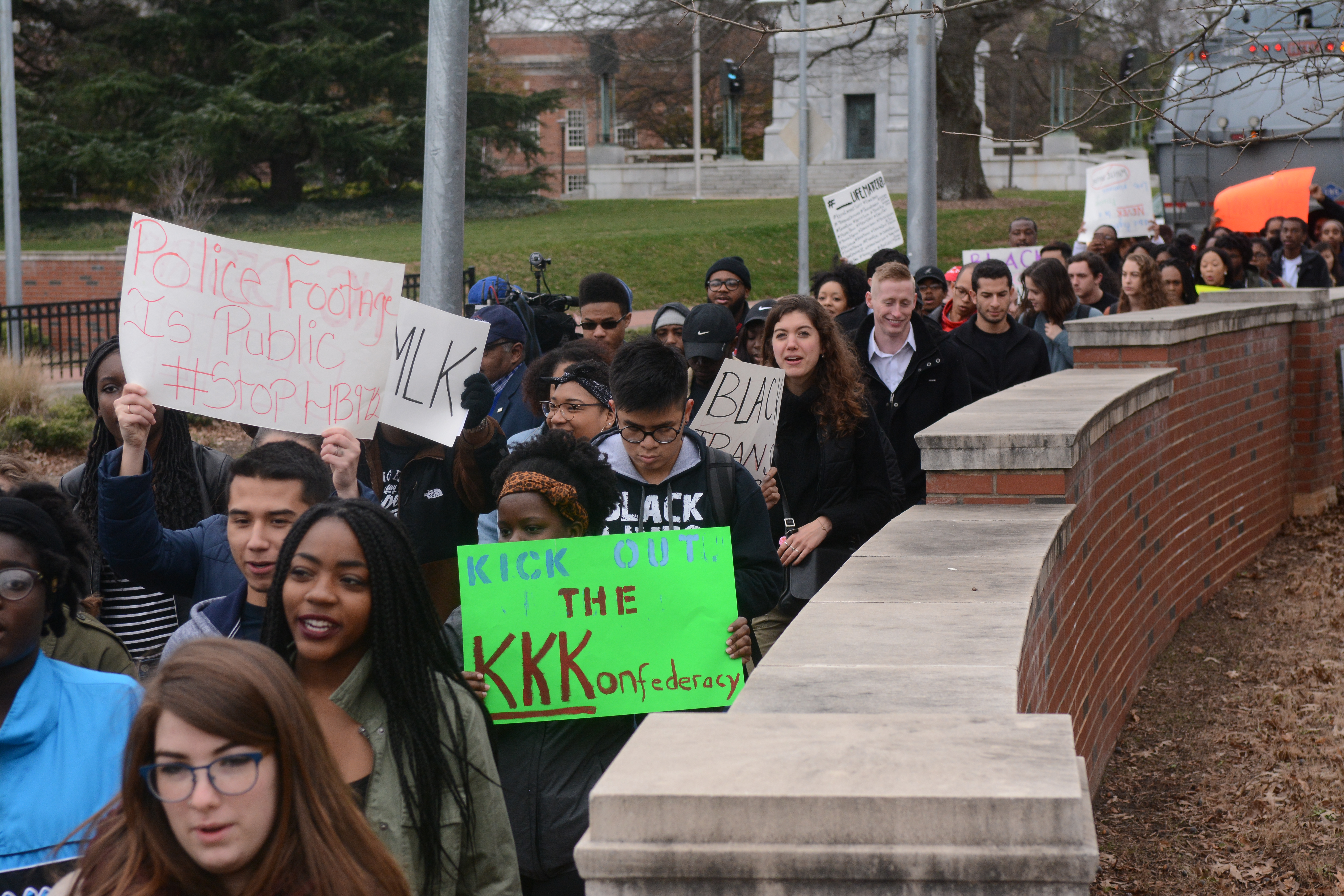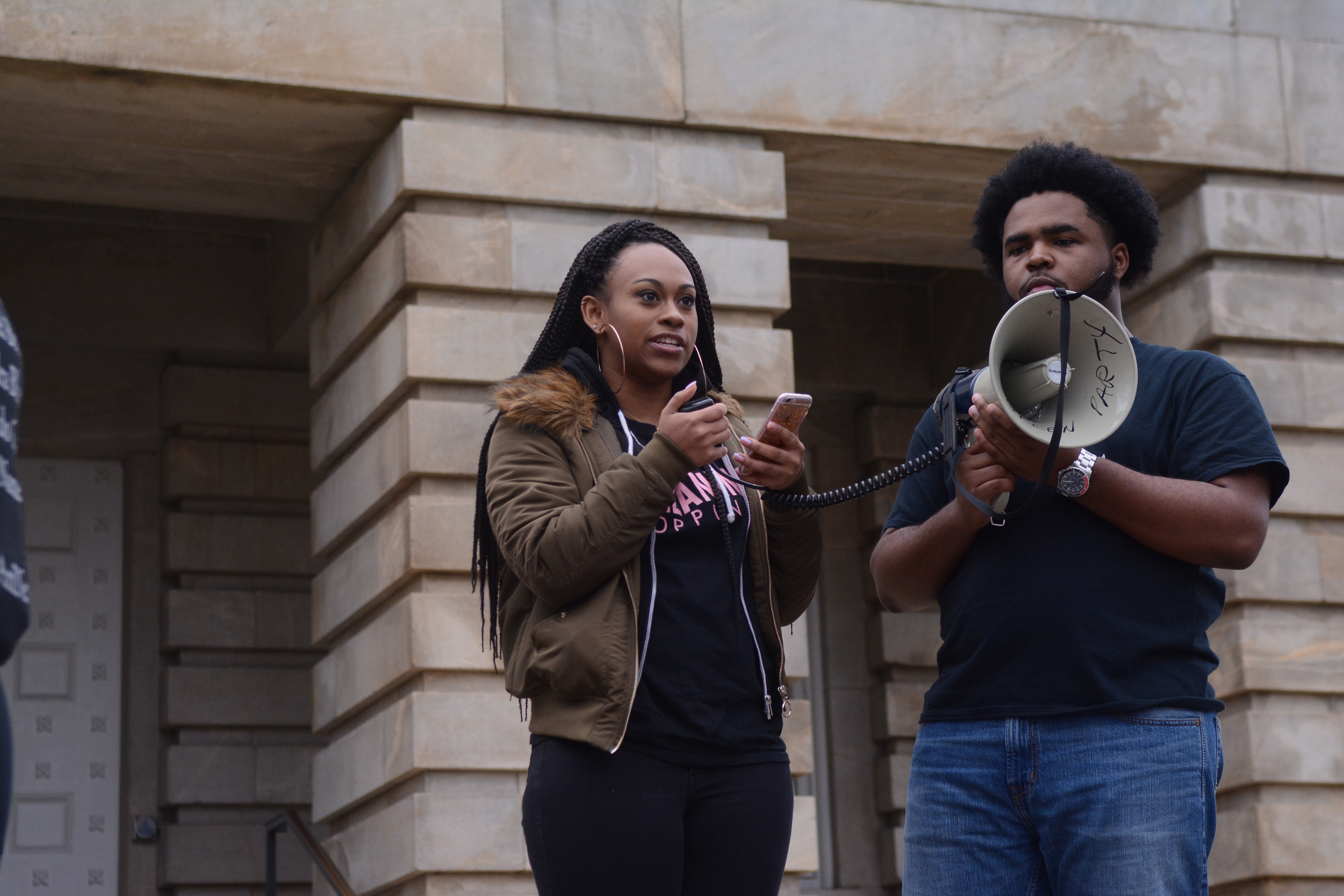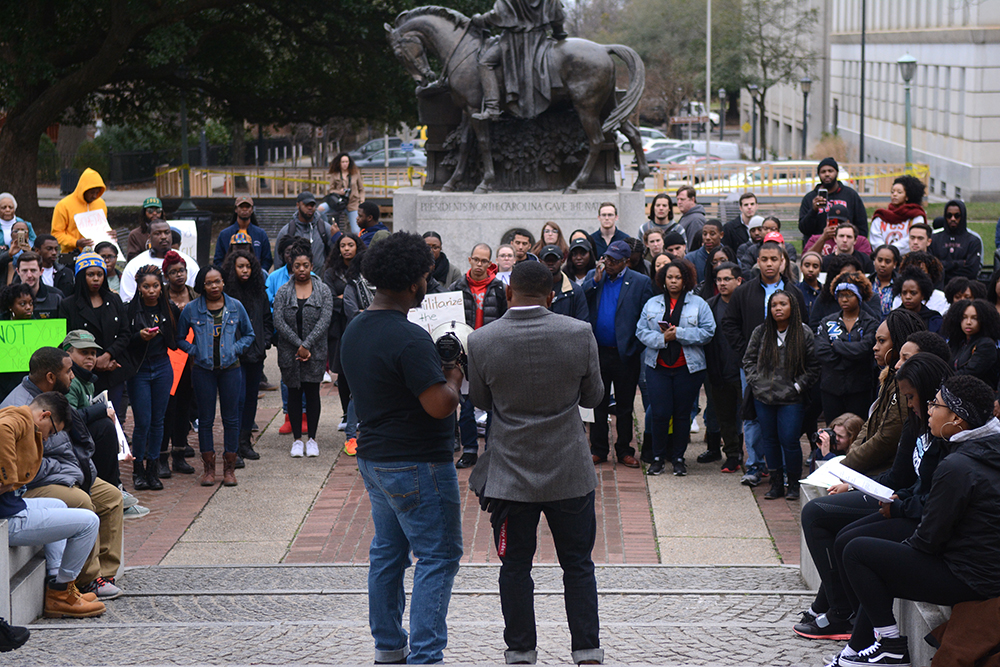Crowd members circle in front of the North Carolina State Capitol building to listen to speakers during the ReclaimMLK March at Raleigh on Jan. 16, 2017. Many individuals who spoke were students from UNC Chapel Hill and NC State University, highlighting issues that included the privatization of higher education, police brutality, and North Carolina House Bill #2 in their respective speeches.
Keilah Davis | Staff Writer
On Monday, Jan. 16th at 1pm students from NC State, UNC-Chapel Hill, Shaw, St. Augustine and surrounding universities held a Reclaim MLK march and rally in Raleigh, NC. The march began at the NC State belltower and ended with a rally at the North Carolina State Capitol building.
“These next four years are gonna be hard for a lot of reasons. It’s important to be engaged and become educated on the issues. It’s okay to be ignorant but it’s not okay to remain ignorant. That’s why we’re here today.” Jerome Simpson, a member of Black Congress.
According to Street, the goal of a student group at UNC-Chapel Hill called Black Congress, is to “engage UNC, NC State, Duke and other Triangle schools to keep students informed on global issues and keep students engaged.” Black Congress co-organized the event with NC State students Achaia Dent and Amani Manning.
Over 100 students and community members attended the march. Some community members joined along the way.
A member of the Gamma Tau chapter of Iota Phi Theta Fraternity, Incorporated from Shaw said that he and his brothers wanted to “try to make our voices be heard and make a difference in the community.”
“If people are upset about what’s going on, then you have to do something about it,” Paul Nolan, NC State student body president and senior studying material science and engineering, said. “So instead of talking to strangers on the internet or doing my own thing, I’m out here.”
Participants marched along to call-and-response chants: “No justice! No peace!” As the crowd passed the NC Republican Party headquarters on Hillsborough Street, they chanted “no Trump! No KKK! No fascist USA!”
“There are very few holidays in the U.S. that celebrate blackness and African-American history and MLK Day is one of those,” Kinesha Harris, a senior studying science, technology, and society, said, “It is important to follow with the work that Dr. King has done and keep moving forward. Showing that we will not accept the way things are now is definitely a good start.”
Some participants held signs that read “#ReclaimMLK,” “Black Trans Lives Matter” and “Not Your Docile Negro.”

Activists hold their signs high as they make their way down Hillsborough Street during the ReclaimMLK March at Raleigh on Jan. 16, 2017. The march began at the NC State Belltower and followed Hillsborough Street to the North Carolina State Capitol building where individuals spoke about grievances and issues facing schools and communities in North Carolina and the nation.
“The leaders of this group are very diverse,” James Ennis Street, a member of Black Congress, said. “For example, I’m black, white and Native American. I identify as queer. I identify with disabilities. There’s a bunch of things that I feel like are part of me that I want to be represented in different movements that all aspire to my liberation. I think that you can’t have an incomplete liberation. It has to be complete and total which means that every single thing needs to be addressed.”
During the 40-minute march to downtown Raleigh, multiple cars passing the marchers on Hillsborough Street honked their horns or rolled down their windows to give the group a thumbs up.
“A lot of people I know take MLK Day for granted,” Colin Beamer, executive chief of staff in NC State Student Government, and senior studying political science said. “They look at is as a day off to not do anything. I wanted to stop being part of that. This morning we organized some service stuff with Student Government and I wanted to be out here to be visible. I think that not enough white people use their privilege to stand together in solidarity with communities of color.”
The rally began with statements on Martin Luther King Jr.’s legacy as a radical activist disliked by many Americans during his lifetime.
“We’re here to reclaim that legacy in a radical, revolutionary way and show the people that we’re not just docile negros,” Dominique Brodie, sophomore at UNC-Chapel Hill and member of Black Congress, said. “We’re not gonna be quiet. We’re not gonna respect your peace. We’re gonna make as much noise as we need to until we get our justice.”
Achaia Dent, a sophomore studying animal science at NC State, spoke next. “I’ve come here today to give a message of hope and forward thinking and to also go back and fetch that which we may have forgotten,” Dent said.

As part of the ReclaimMLK March at Raleigh on Jan. 16, 2017, Achaia Dent, a sophomore studying animal science, speaks in front of the North Carolina State Capitol building. Dent emphasized the legacy of Dr. Martin Luther King Jr. in her words, reading some of Dr. King’s famous “I Have a Dream” speech, and urged the crowd to continue being active to fix issues minorities face.
Other organizers and audience members also spoke on topics of injustice including privatization of education, House Bill 2, police brutality, and voting rights. Street also acknowledged the historical and contemporary genocide and violence inflicted on Native American people.
“It is only when the oppressed find the oppressor out and become involved in the organized struggle for their liberation that they begin to believe in themselves,” Amani Manning, a senior studying political science at NC State, said quoting Paulo Freire’s Pedagogy of the Oppressed. “We have got to become aware of what our reality is.”
Charity Lackey, a member of Black Congress, led the crowd in a final chant, quoting Assata Shakur, to close the rally. “It is our duty to fight for our freedom. It is our duty to win. We must love each other and support each other. We have nothing to lose but our chains.”



